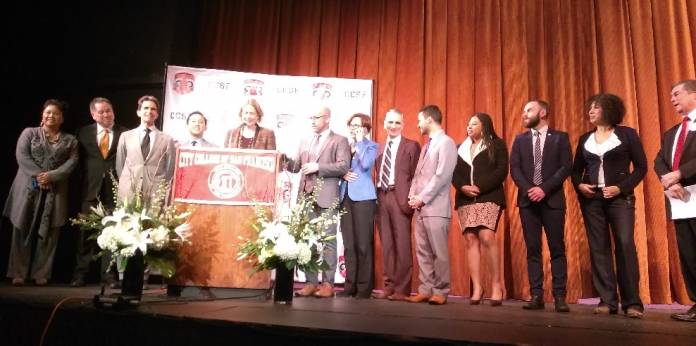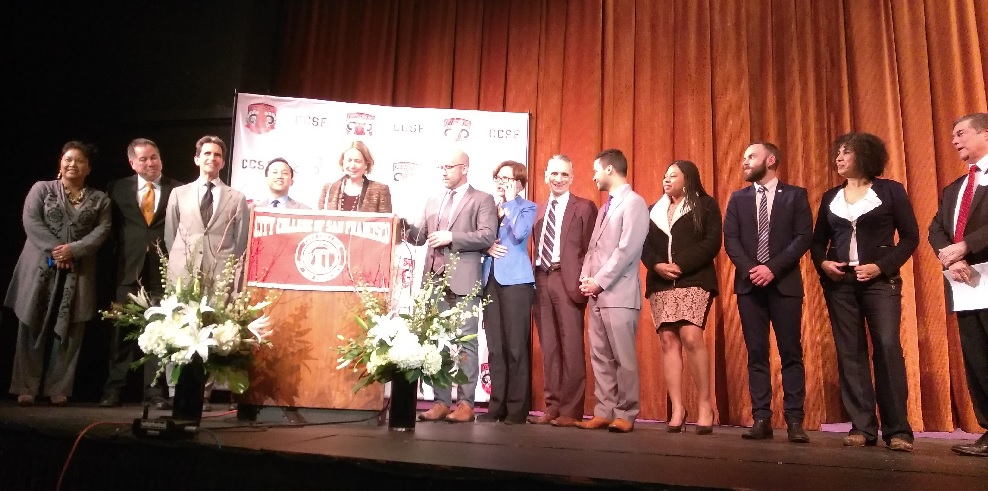
City College of San Francisco will continue as an accredited institution for the next seven years, the Accrediting Commission for Community and Junior Colleges announced on January 13.
But a long list of issues still remains – including the future of the ACCJC and a large debt that the school may or may not owe to the state of California.

The announcement comes five years after the ACCJC ruled that City College was out of compliance when it came to record keeping, financial management, and governance. As a result, it threatened to pull the college’s accreditation.
“This decision is a major win and a testament to the dedication and hard work of the entire City College community,” Interim Chancellor Susan Lamb said at a January 13 news conference in the Diego Rivera Theater that included local city officials and college trustees. “With the help of elected officials and San Francisco voters, we came together under extremely difficult circumstances and worked hard to achieve this major milestone.”
“When a bully in power is trying to do unreasonable and harmful things the proper response is not accommodation,” Board of Trustee President Rafael Mandelman said. “The proper response is resistance.”
Mandelman was making reference to ACCJC President Barbara Beno who spearheaded the commission’s campaign to revoke City College of San Francisco’s accreditation, but was recently placed on administrative leave until her June retirement.
In 2013, City Attorney Dennis Herrera filed and won a lawsuit against the ACCJC citing unlawful business practices in the evaluation process of the college. In addition to saving City College from termination, it also ensured a fair assessment of City College.
Former State Sen. Mark Leno, who worked to get City College stabilization funding, told a crowd of some 50 people in attendance that, “City College is too valuable for a city of immigrants.”
Help us save local journalism!
Every tax-deductible donation helps us grow to cover the issues that mean the most to our community. Become a 48 Hills Hero and support the only daily progressive news source in the Bay Area.
California State Assemblymembers Phil Tang and David Chiu were also in attendance.
“I have faith other students will come because we are here to stay,” Student Trustee Bouchra Simmons said.
City College’s enrollment took a tremendous hit after the ACCJC threatened to revoke the college’s accreditation.
The college once boasted a student body of over 90, 000, but now has an enrollment of about 65,000.
“The cloud has been lifted, but we are still left with the shambles to clean up,” Trustee member Alex Randolph said. “We wouldn’t even have a discussion about the type of class reductions that we need to do over the next couple of years if this accreditation crisis never happened.”
Newly-elected Trustee Tom Temprano agreed with Randolph’s stance on boosting enrollment.
“We’ve been looking over our shoulder for five years, now it’s about the board actually looking forward and creating a vision for what we want the future of this college to look like,” Temprano said.
Although the accreditation crisis is over, Temprano acknowledged that there is much work that has to still be done to “dispel what has been five years of bad news.” The small business owner also pointed out the need to rebuild facilities and improve classrooms.
With plans of improving the college’s future, Trustee Brigitte Davila said “the biggest mistake would be to say it’s done with and it’s behind us.”
Mandelman said that the current version of the ACCJC is “significantly different” from the panel that tried to shut down City College. Most of the commissioners are new, and Beno is gone, he said, and the reception City College got in its appearance before the panel was far more professional.
But Tim Killikelly, president of the teacher’s union, AFT Local 2121, said that the ACCJC can’t just move on without serious changes. “There needs to be discussion about what went wrong with their process,” he said. “None of this should ever have happened in the first place, and they can’t just say they’ve resolved the situation without looking at how their own failures caused this problem.”
The ACCJC is under fire in both Sacramento and Washington, DC, where officials are considering scrapping the agency and creating another accreditor.
Meanwhile, City College faces another battle in the wake of an external report alleging that City College was unable to prove that 16,000 students actually took online classes, and the state wants the school to repay $39.8 million.
But that’s not a sure thing, either. The controversy, Mandelman said, is somewhat unusual: Nobody doubts that the classes took place, and in most of them, he said, the majority of the instruction was in the classroom and only about 20 percent was online.
The state rules say that all online instruction needs to be fully recorded on the web, and some of those classes weren’t properly recorded. “The instruction took place, and the students got grades, so it’s a pretty bad precedent to try to take back that money,” Killikelly said.
Most of the money that the state is asking for is bailout funding that City College got during the ACCJC mess, Mandelman said. “The state has made clear that it has an interest in the success of City College,” he said. “It makes no sense at this point to try to claw that money back.”
The school is appealing the assessment.


I have had that same thought. They are teetering on the edge as it is. Both the state and Department of Education are ready to show them the door. Of course, Trump’s election might well have an effect on the DOE, but California could still shut them down. They may well be trying to save themselves.
Looking between the lines I see here an attempt to salvage the ACCJC. Sidelining Beno was a good step, but I’ll bet some of her henchmen remain on staff. I wonder if the policies and procedures that allowed Beno to rewrite a visiting team report recommending probation for CCSF and browbeat the commission into a closure vote remain in place. I also wonder if the ACCJC is still getting money and policy cues from right wing organizations like ALEC.
Board President Mandelman is quoted in this article saying: ““When a bully in power [the ACCJC] is trying to do unreasonable and harmful things, the proper response is not accommodation, the proper response is resistance.”
Back in 2013, some disputed Mandelman’s SF Chronicle opinion piece where he suggested CCSF deseved to be sanctioned by the ACCJC. In his wordfs:
“Perhaps most troubling to the accrediting commission might have been a sense that City College was not interested in acknowledging, much less fixing, its problems. There has been much debate about whether the ominous requirement that the college prepare a plan for closure was excessive for a school that had not been sanctioned before. But the sanction almost certainly sprang from a concern that only such severity would get the attention of an institution as large, byzantine and arrogant as City College.”
http://www.sfgate.com/opinion/openforum/article/City-College-plans-to-stay-open-4337890.php#ixzz2MviApQbh
I think there needs to be some transparency about what really went on. Was this an attempt to aid for profit schools, like Corinthian, which was fully accredited by ACCJC, an attempt to make some very valuable real estate available, or some other scam?
There should be a class action suit on the part of the many PT teachers who have lost their employment and benefits due to the shrinkage caused by the ACCJC’s actions.